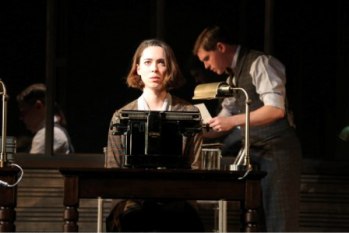Review: Machinal

Rebecca Hall (foreground) with Jason Loughlin and Ryan Dinning (background) in Machinal
(©Joan Marcus)
The Roundabout Theatre Company’s current revival of Sophie Treadwell’s classic 1928 Expressionist drama Machinal represents a marked departure from this non-profit theater’s usual staid diet of Shaw and drawing room comedies. Featuring a galvanizing staging by up-and-coming British director Lyndsey Tuner and a striking scenic design Es Devlin, this production starring Rebecca Hall breathes new life into this rarely seen curiosity piece.
Inspired by the true story of Ruth Synder--who was executed for killing her husband and whose electric chair photo famously made the front page of the Daily News--the play is sometimes off-putting in its stylized language and stilted dramaturgy. But it fascinates nonetheless, both as an example of its dated theatrical style and its still powerful portrait of a hapless young woman victimized by an oppressive society.
Composed of nine “episodes,” the play depicts the ill-fated marriage between a “Young Woman” (Hall) and her boss (Michael Cumpsty) at the company where she works as a stenographer. When first seen, Helen, as she is referred to in the script, is frantically fleeing the cramped confines of an overcrowded subway car, and it soon becomes clear that this is merely the first example of her lack of coping abilities.
Subsequent episodes depict her strained relations with her co-workers and her endlessly nagging mother (Suzanne Bertish); her awkward honeymoon with her patronizing, overbearing new husband; her giving birth to an unwanted child; and her meeting with a sexy man (Morgan Spector, in the role originally played by a young Clark Gable) with whom she has a rapturous one-night stand. It’s only in the latter scene in which Helen seems to come to thrillingly vibrant life, giggling and acting like a giddy teenager when she previously seemed to wander through life in a dazed stupor.
This sexual awakening prompts her to brutally murder her husband, and she is quickly put on trial and sentenced to death. The play ends with her strapped in the electric chair, as a sudden bright light signals the switch being pulled.
The work is difficult to take at times, with its clipped, staccato dialogue and a stream-of-consciousness monologue that seems to go on forever. But its strengths are superbly realized in this suitably stylized production featuring a dazzling series of sets constantly shifting on the revolving turntable stage.
At first, Hall seems somewhat miscast in the lead role, with her striking beauty and amazon-like physique at odds with her character’s mousy demeanor and victim-like status. But her deeply committed performance eventually overcomes any reservations, and indeed makes Helen’s fate seem all the more tragic.
The ever-reliable Cumpsty and the physically imposing Spector offer excellent support as the central male characters; Bertish well conveys the mother’s grating qualities; and the large ensemble fills their multiple roles with skillful precision.
It was a gutsy move for this traditionally conservative theater company to put on this audacious production of such a challenging work. Fortunately for them and their audiences, that risk has been amply rewarded.
American Airlines Theatre, 227 W. 42nd St. 212-719-1300. www.roundabouttheatre.org. Through March 2.
| Print article | This entry was posted by Frank on 01/17/14 at 05:28:02 am . Follow any responses to this post through RSS 2.0. |